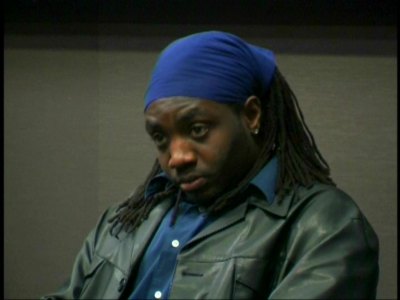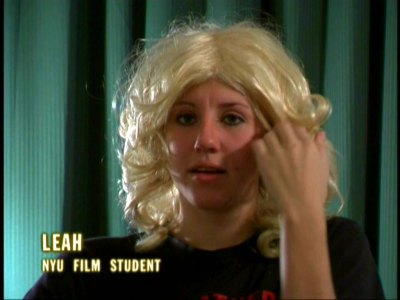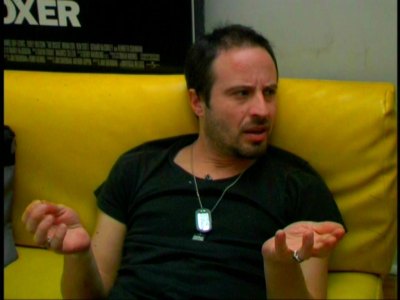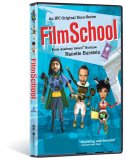| Reviews & Columns |
|
Reviews DVD TV on DVD Blu-ray 4K UHD International DVDs In Theaters Reviews by Studio Video Games Features Collector Series DVDs Easter Egg Database Interviews DVD Talk Radio Feature Articles Columns Anime Talk DVD Savant Horror DVDs The M.O.D. Squad Art House HD Talk Silent DVD
|
DVD Talk Forum |
|
|
| Resources |
|
DVD Price Search Customer Service #'s RCE Info Links |
|
Columns
|
|
|
Film School
Labeled a "docu-series" by its host channel IFC, 2004's ten-part TV series Film School follows three New York University film students as they struggle to get their year-end semester projects - a professionally executed ten-minute film - planned, produced, shot and exhibited in time for the prestigious NYU First Run Festival. Initially focusing on four students (one eventually drops out due to a personal crisis), Film School may be of interest to those thinking of going to film school, but I'm not sure the average viewer is going to become emotionally involved either with the students "cast" for this reality series, or with the frequently self-indulgent, self-important process these students go through to get their film shorts produced. Film School obviously wants to be inspirational, and perhaps it will be to some, but more often than not, it comes off as an annoying - and at times surprisingly tasteless - exercise in phoney, heightened reality series dramatics.

Film School's creator and producer Nanette Burstein (The Kid Stays in the Picture) picks four diverse students to represent the experience of going to NYU Film School. Alrick Brown, a 28-year-old Jamaican-born activist, is striving to make a comic book-styled live-action feature titled The Adventures of Super Nigger, based on the real-life shooting of Amadou Diallo. Leah Meyerhoff, a 24-year-old Brown University graduate is pursuing Twitch, an autobiographical account of Meyerhoff's conflicted, stormy relationship with her mother, who suffers from multiple sclerosis. Vincenzo Tripodo, a 35-year-old Sicilian who left his successful opera director career (it's never explained why he left such a prestigious career) to come to NYU, is pursuing Heart of Spider, a supposedly true love story about a local New Yorker who used to scare people with his fake spider, at the restaurant where Tripodo worked when he first arrived in NYC. And finally, Barbara Klauke, a painfully shy, quiet 28-year-old former doctor's office receptionist who wants to make a film about the relationship between an escaped lab monkey and a repressed mall security guard.
Detailing the frequently torturous pre-production process of planning, casting, and financing their projects that film students endure - as well as the traumas of actually shooting and editing their films, Film School tries to paint a picture that suggests only those with nerves of steel and iron wills can (or should) try film school at NYU. And while those trials and tribulations seem to come from both the outside realities of independent filmmaking and through the results of the student's own idiosyncracies and stubborn naivetes, Film School never seems to impress us as anything more than a superficial, voyeuristic peek at artists we the audience have a hard time caring about in the first place.
Alrick, who we're reminded was a Peace Corps worker, takes the infamous Diallo case (a case, by the way, that's not as cut and dried as Aldrick would like us to believe) and relates it to his own personal loss of his father to violent crime. But any sympathy or relevancy we may feel towards Alrick is pretty much mitigated by Film School's insistence on showing Alrick in a stereotypical light: the artist-as-all-consumed-unfeeling-stud. When Alrick proudly proclaims how many women he's essentially used, and then we witness his callous treatment of his loving girlfriend, sympathy for his plight goes right out the window. We never really get any background on Vincenzo's journey to America (if he was so successful in Italy, why is he here, with zero money, working in a restaurant, trying to get a student film made?), nor do we get close to him, particularly when we see him at work during the actual shoot, when he comes off like a cross between Otto Preminger and Peter Sellers in After the Fox. It's also fairly disingenuous to suggest the filmmakers had no influence or impact on the happenings on the screen, particularly when Vincenzo magically gets a scholarship out of nowhere when he's about to be kicked out of school (I'm sure the fact that he was being filmed for a television series that advertises a school that charges over $40,000 a year in tuition had nothing to do with this sudden windfall). And Leah's deeply unattractive treatment of her handicapped mother (not to mention the creepily manipulative manner in which she uses her mother for her film) is instantly off-putting, and rather horrifying. Seeing Leah play at being some kind of crackpot junior psycho-sexual therapist when interviewing her potential actors, to watching her manipulate a 16-year-old actress to engage in a frank sex scene (much to the disgust of her crew), Leah comes off as the kind of self-absorbed, self-important, humorless "artiste" that people laugh at in spoofs and farces -- and whom unfortunately seem to flourish in independent cinema. Only shy, interior Barbara, at first, seems remotely approachable, but that soon fades when she petulantly breaks down on the roadside, looking for locations for her film. Film School frequent tastelessness reaches rock bottom when producers insist on showing a totally unnecessary, excruciating long, hurtful video of Barbara's devastating emotional reaction to the death of her grandmother, the crisis that quickly prompts Barbara to drop out of school.

And if we feel distant, at best, from the students we're supposed to admire and root for in Film School, the professors shown in the series confirm the worst stereotypical notions we have of elitist New York academics - a notion echoed by the reaction of the students to their professors' evaluations of their work, opinions which the students immediately and summarily denigrate and dismiss. When one professor stubbornly and rather cryptically suggests that Vincenzo's film doesn't "represent" NYU Film School concepts and ideas, you immediately get the sense that the films delivered up to these professors had better go along with their own political and aesthetic preoccupations - or else (which, come to think of it, could cover most professors in most universities and colleges, in most disciplines today).
Putting all of that aside (and that's a tall order), perhaps the biggest failing of Film School is the one that seems the most obvious omission, and one that really cheats the audience that has invested over four hours in watching these student filmmakers on their personal and artistic journeys of self-discovery: they don't show us the student's finished films. Whether it's a matter of copyright (which I tend to doubt, considering the low-budget nature of these student films), or some kind of perverse desire to elevate the "artistic process" over the end product, the producers of the series fail to include the final ten minute films at the end of the series (or as a bonus for the DVD set). It's really loopy to ask an audience to sympathize with and follow three filmmakers, to invest in their quest for emotional and artistic expression, and then deny that audience the chance to see the fruits of those students' labor. If I had my cynical druthers, I would suspect the producers left off showing these films because - as is common with most student films - the quality of their artistic content probably doesn't justify all the sturm und drang that went along with making them, let alone a ten-part TV series devoted to their directors. But again, that's just guessing, since the producers of Film School don't see fit to show the end product of their ten episode tease.

The DVD:
The Video:
Typical of a hand-held camera reality series, Film School's full-frame video image can look a little shaky, with blurring whip pans and burnt-out lighting. I noticed some compression issues at times, but it's not overly distracting.
The Audio:
The Dolby Digital English 2.0 stereo soundtrack is more than adequate for this largely dialogue-laden series. There are no subtitles or close-captioning options.
The Extras:
There are no extras for Film School -- not even the finished products of the three student directors.
Final Thoughts:
I'm not sure what the point of the three-disc, four hour-plus Film School is when the producers pick three unengaging students as their focus, and then proceed to showcase them in a most unflattering light. Whether the students have been shaped (as is the case with most reality series) to look this way, or, more frighteningly, they're actually enacting their own stereotypical ideals of what an independent "film artiste" should act like, is ultimately beside the point when the series refuses to show the audience the final end product of these students' efforts. It's a stunningly obvious -- and critical -- blunder from which Film School doesn't recover. A rental may suffice if you're into stereotypes associated with independent filmmaking, but for all others, skip it.
Paul Mavis is an internationally published film and television historian, a member of the Online Film Critics Society, and the author of The Espionage Filmography.


|
| Popular Reviews |
| Sponsored Links |
|
|
| Sponsored Links |
|
|
| Release List | Reviews | Shop | Newsletter | Forum | DVD Giveaways | Blu-Ray | Advertise |
|
Copyright 2024 DVDTalk.com All Rights Reserved. Legal Info, Privacy Policy, Terms of Use,
Manage Preferences,
Your Privacy Choices | |||||||













